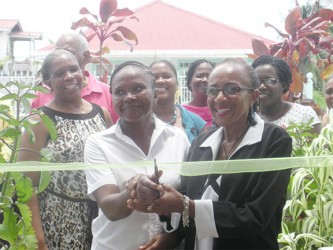With over 800 youngsters in care of the state, the newly launched Women’s Refuge (WF) aims to reunite them with their mothers by offering shelter and services to these parents.
Women’s Refuge (WF) was officially launched yesterday by PATOIS (Personal Achievement to Overcome Individual Struggles). WF seeks to reunite families where children were removed due to abuse, abandonment or neglect.
At the opening ceremony, Lead Counsellor Colleen Baptiste explained that WF focuses on reforming single mothers through behavioural change. “We believe that if you empower an individual through behavioural change, you empower a family,” Baptiste said. She continued, “If you empower a family, you empower a community; if you empower a community, you empower a nation… What we provide here is the means to effect behavioural change within these women for the purpose of reunifying them with their children.”

Baptiste noted that many persons may view the problem as too large for an initiative that only caters to 12 occupants at a time. However, she said, WF is a small start that will hopefully grow into something huge.
According to the counsellor, the problem is indeed a huge one which needs to be addressed by all sectors of society through combined efforts.
“We all need to know that this is our issue and that we need to find a solution… With 800-plus children in the care of the state, it is not an issue that is going to go away soon or ever. It’s not going to go away simply because we ignore it or simply because we shrug our shoulders… It is going on in our communities… so we need to pay attention,” she added.
According to Executive Director of WF Ingrid Goodman, the refuge has a number of components including therapy and education. These components will encompass multiple services such as professional development training, mental status assessments, group therapy and suicide assessment training.
Goodman emphasised that WF has a strict policy of disallowing drug abusers to become occupants and pointed out that the shelter is not a drug-rehabilitation clinic though it does provide alcohol and other drug counselling.
Over the years, Goodman has been providing a number of services in Guyana including counselling; all of these culminated in the establishment of the refuge.
She reiterated the need for such an initiative, stating that wards of the state seldom return to their parents and, when they do, it is after many years without any form of rehabilitation.
Throughout the presentations, it was noted that WF could not work alone or in isolation and is looking to work closely with other non-governmental organisations (NGOs), government ministries and any other interested persons.
According to Goodman, though some partners including Food for the Poor Guyana and the Child Care & Protection Agency (CC&PA) have come onboard, many more partnerships are needed.
WF caters for single mothers between the ages of 18 and 35 residing in Region 4 whose children have become wards of the state.
These mothers are allowed to stay up to 45 days in any single calendar year. The application procedure entails referrals from CC&PA, the Ministry of Human Services, and/or via the family court.
Some of the mothers, Baptiste noted, may have been recently released from prison, a fact the refuge caters for.
Services provided include temporary emergency shelter, meals, and transportation along with case management and assistance in locating permanent housing and jobs. Occupants will also be privy to workshops in coping skills, parenting education and money management.




